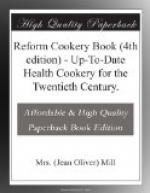A frequent mistake, then, is that of making a wrong selection of foods, or combining them unsuitably, or in faulty proportions. For example, rice, barley, pulses, &c., may be, and are, all excellent foods, but they are not always severally suitable under every possible condition. Rice is one of the best foods the earth produces, and probably more than half of the hardest work of the world is done on little else, but those who have been used to strong soups, roast beef, and plum pudding will take badly with a sudden change to rice soups, rice savoury, and rice pudding. For one thing, so convinced are we of the poorness of such food, that we should try to take far too much, and so have excess of starch. Pulse foods, again,—peas, beans, lentils—are exceedingly nutritious—far more so than they get credit for, and in their use it is most usual to heavily overload the system with excess of nitrogenous matter. One lady told me she understood one had to take enormous quantities of haricot beans, and she was quite beat to take four platefuls! ‘I can never bear the sight of them since,’ she added pathetically. Another—a gentleman—told me vegetarianism was ’no good for him, at any rate, for one week he swallowed “pailfuls of swill,” and never felt satisfied!’ While yet a third—no, it was his anxious wife on his behalf—complained that ’he could not take enough of “that food” to keep up his strength.’ He had three platefuls of the thickest soup that could be contrived, something yclept “savoury”—though I cannot of course vouch for the accuracy of that definition—a substantial pudding, and fruit. He ‘tried’ to take two tumblers of milk, but despite his best endeavours could manage to compass only one! I sympathised heartily with the good lady’s anxiety, and urged that they go back to their “morsel of meat” without delay, and dispense with the soup, the “savoury,” the milk, and either the fruit or the pudding. In reply to her astonished look, I gravely assured her that it was evident vegetarianism would not do for them, and her look of relief made it clear that she never suspected the mental reservation, that the tiny bit of meat was invaluable if only to keep people from taking so much by way of compensation.




